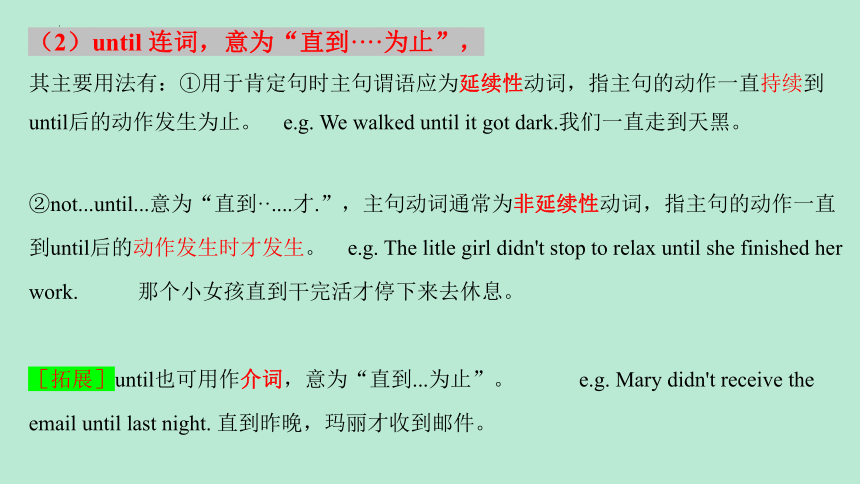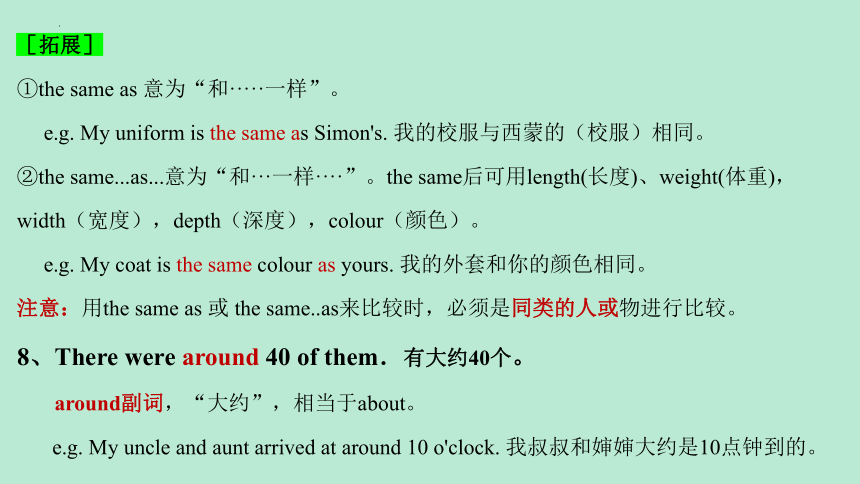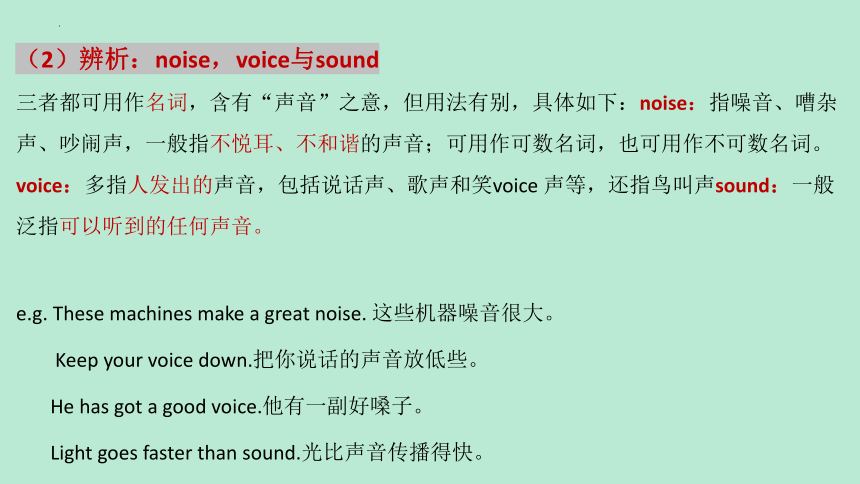牛津译林版八年级英语下册Unit 4 A good read(reading知识点总结课件(共17张PPT)
文档属性
| 名称 | 牛津译林版八年级英语下册Unit 4 A good read(reading知识点总结课件(共17张PPT) |

|
|
| 格式 | pptx | ||
| 文件大小 | 110.1KB | ||
| 资源类型 | 教案 | ||
| 版本资源 | 牛津译林版 | ||
| 科目 | 英语 | ||
| 更新时间 | 2022-03-31 13:55:12 | ||
图片预览







文档简介
(共17张PPT)
U4 A good read
(main points2)
Story Time
5、It moved up over my stomach and neck until it was standing near my face.
它向上爬过我的腹部和脖子,直到站在我的脸附近。(1)辨析:over,through与across①over意为“从(某物的)一边到另一边”,表示从物体的上方越过。
e.g. jump over the fence 跳过围栏(从围栏上越过)
②through 意为“穿过,从······中通过”,着重指从空间内部穿过。
e.g. through the tunnel 穿过隧道(从隧道中间通过)
③across 意为“横过,穿过”,着重指从物体表面的一边到另一边。
e.g. across the road 横穿马路(从马路一边到另一边)
over
through
across
(2)until 连词,意为“直到····为止”,
其主要用法有:①用于肯定句时主句谓语应为延续性动词,指主句的动作一直持续到until后的动作发生为止。 e.g. We walked until it got dark.我们一直走到天黑。
②not...until...意为“直到··....才.”,主句动词通常为非延续性动词,指主句的动作一直到until后的动作发生时才发生。 e.g. The litle girl didn't stop to relax until she finished her work. 那个小女孩直到干完活才停下来去休息。
[拓展]until也可用作介词,意为“直到...为止”。 e.g. Mary didn't receive the email until last night. 直到昨晚,玛丽才收到邮件。
6、I looked down and saw a very small man.我低头看了看,看见一个非常矮小的男人。 look down 意为“向下看,低头看”。 e.g. The girl was very shy. She looked down at her feet. 那个女孩很害羞,她低下头看着自己的脚。[拓展]look构成的常见短语还有:look up向上看;查阅 look out 当心 look out of 从向外看
look to the left 向左看 look for 寻找 look over 检查look up and down 上下打量 look at看 look forward to 期待,盼望
look into...向····里看 look around 环顾四周 look after 照顾7、He was the same size as my little finger!他不过就我小手指那么点儿大!
the same size as...“和··一样尺寸,与一样大小”= as big as。 e.g. My mother's shoes are the same size as mine.=My mother's shoes are as big as mine. 我妈妈的鞋和我的鞋号码相同。
[拓展]
①the same as 意为“和·····一样”。
e.g. My uniform is the same as Simon's. 我的校服与西蒙的(校服)相同。
②the same...as...意为“和···一样····”。the same后可用length(长度)、weight(体重),width(宽度),depth(深度),colour(颜色)。
e.g. My coat is the same colour as yours. 我的外套和你的颜色相同。
注意:用the same as 或 the same..as来比较时,必须是同类的人或物进行比较。
8、There were around 40 of them.有大约40个。
around副词,“大约”,相当于about。
e.g. My uncle and aunt arrived at around 10 o'clock. 我叔叔和婶婶大约是10点钟到的。
[拓展]
①around作副词时,还表示“在周围,到处,四周”。 e.g. I looked around, but saw nothing. 我四下看了看,但什么也没有看见。②around还作介词,意为“遍及,在··四周”。 e.g. There are many trees around the castle. 城堡四周有许多树。
9、I shouted at them-the loud noise made them all fall over.
我朝他们吼叫,很大的声音使得他们都倒了下去。
(1)shout at 意为“冲······大喊大叫”,多指因为生气等而非善意地对某人吼叫。
e.g. Don't shout at others. It is impolite. 不要冲别人大声喊叫,这是不礼貌的。
[拓展] shout to 意为“向······叫喊”,多指因距离远而不得不大声叫喊。
e.g. I heard someone shout to me in the distance. 我听见有人在远处叫我。
(2)辨析:noise,voice与sound
三者都可用作名词,含有“声音”之意,但用法有别,具体如下:noise:指噪音、嘈杂声、吵闹声,一般指不悦耳、不和谐的声音;可用作可数名词,也可用作不可数名词。voice:多指人发出的声音,包括说话声、歌声和笑voice 声等,还指鸟叫声sound:一般泛指可以听到的任何声音。
e.g. These machines make a great noise. 这些机器噪音很大。
Keep your voice down.把你说话的声音放低些。
He has got a good voice.他有一副好嗓子。
Light goes faster than sound.光比声音传播得快。
(3)make sb do sth.“使某人做某事”,省略to的动词不定式在make 后作宾语补足语。 e.g. Who made the little boy cry 谁把这个小男孩弄哭了?
[拓展]
①make sb/sth +形容词,“使某人/某物.......”
e.g. Light music makes me relaxed. 轻音乐使我很放松。
②make sb +名词,“使某人成为...”
e.g. The teacher tried his best to make himself a good friend of his pupils.
那位老师尽最大努力使自己成为学生的好朋友。
③make sb.+过去分词,“使某人被..”
e.g. I can't make myself understood in Chinese. 我说汉语,别人听不懂。
(4)fall over 意为“摔倒”。
e.g. He fell over when he was skating. 他溜冰的时候摔倒了。
[拓展]
①fall off“(从···上)摔下”。
e.g. The boy fell off the tree yesterday. 这个男孩昨天从树上摔了下来。
② fall down 意为“摔倒;落下;倒塌”。
e.g. My mother fell down from her bike just now. 我的母亲刚才从自行车上摔了下来。③ fall behind 意为“落后”。 e.g. If you don't work hard, you will fall behind. 如果学习不努力,你就会落在你同学后面。④fall asleep 意为“睡着,进入梦乡”。 e.g. My grandmother fell asleep while she was watch-ing TV. 我奶奶看电视的时候睡着了。
10、However,they soon got up again and continued moving across my body.
然而,他们很快又爬了起来,继续在我的身体上走动。
continue 及物动词,意为“继续”。
continue doing/to do sth.意为“继续做某事”。
e.g. He will continue his education in the USA. 他将在美国继续求学。
Mike continued reading/to read the novel. 迈克继续读那本小说。
11、One of these small men began talking to me... 其中一个小矮人开始与我交谈··.
one of.....“....之一”,of+可数名词复数/宾格代词的复数。
“one of+复数名词/代词”作主语时,谓语动词用单数形式。
e.g. One of my fingers is bleeding. 我的一个手指在流血。
One of us is going to Europe with Mr Hu. 我们中有一位将与胡老师一起去欧洲。
[拓展]
one of...后的名词前可用形容词最高级修饰,
即“one of+the+形容词最高级+复数名词”,意为“最····的····之一”。
e.g. Tianjin is one of the biggest cities in China. 天津是中国最大的城市之一。
12、I did not know what to say either. 我也不知道说什么。
either 此处用作副词,意为“也”,常用于否定句句末,其前可有逗号,也可没有逗号。e.g. Tom has never been there. I haven't, either. 汤姆从没去过那里,我也没去过。
13、I tried to pull one hand free and finally managed to break the ropes.
我尽力挣脱一只手,最后设法弄断了绳索。
(1)辨析:try to do sth与 try doing sth.
try to do sth:尽力做某事,表示想尽一切办法要把事情办成。
try doing sth:尝试着做某事,指为了达到某种目的而去尝试。
e.g. We tried to stop the factory from putting the waste into the river.
我们尽力阻止那家工厂把废料扔进河里。
I tried clicking the icon, but it didn't work.
我尝试着点击图标,但不起作用。
(2)manage 及物动词,“设法完成”。 manage to do sth.“设法做成某事”。
e.g. The box was very heavy but he managed to carry it. 这个箱子很重,但是他设法搬动了。
辨析:manage to do sth. 与 try to do sth.
manage to do sth:表示“设法完成某事”,强调做了。
e.g. I managed to finish the work on time. 我设法按时完成了工作。
try to do sth:表示“尽力做某事”,但不一定成功。
e.g. I try to let her stay, but she wouldn't listen.我尽力让她留下,但她不听。
[拓展] manage用作及物动词,还可表示“管理;经营”,后接名词或代词。
e.g. The manager will try his best to manage the factory well.
这个经理会尽力把工厂管理好。
14、When I lifted my left hand into the air..当我把我的左手举到空中时···
lift 及物动词,意为“举起,抬高;提高”。
e.g. Can you help me lift the bike onto the truck 你能帮我把自行车抬到卡车上去吗?
[拓展]lift还可用作可数名词,意为“电梯”,指厢式电梯。 e.g. We'll take a lift to go up and down. 我们将乘电梯上下楼。15、I looked down and saw a huge army of tiny people.
我低头向下看,看见一大群小矮人。 an army of...意为“一群....”,此处army用作名词,意为“大批,大群”。 e.g. An army of ants worked at my feet. 一群蚂蚁在我脚边忙碌着。
[拓展]army用作名词时,还表示“军队(尤指陆军)”。
e.g. Her husband has been in the army for five years. 她的丈夫在军队服役5年了。
16、"I must run away from them,"I thought,but I did not know how to get away.
我想我必须逃离他们,但我不知道怎样脱身。(1)run away from....,“逃离......”。from后跟人或地点名词;
run away“逃跑,跑开”。 e.g. The man tried his best to run away from the place. 那个男人想方设法逃离那个地方。 e.g. If the house is on fire, you must run away as fast as possible.
如果房子着火,你必须尽快跑开。(2)get away “逃跑,离开”,=run away
e.g. The girl was so sad. She decided to get away at once.
这个女孩是如此伤心,她决定马上离开。17、keep doing something一直做某事 keep doing sth. “不断地做某事,一直做某事”,强调动作的延续性。 e.g. The writer kept writing his novel. 那个作家一直在写他的小说。
[拓展]
① keep on doing sth.“反复做某事,继续做某事”,强调动作的反复性。 e.g. He kept on telling me how to do word processing.
他不停地告诉我如何进行文字处理。②keep sb. from doing sth.“阻止某人做某事”,其中介词from不能省略。
e.g. We should keep the farmers from cutting down many trees.
我们应当阻止农民砍伐很多树木。
18、Gulliver found hinself unable to move. 格列佛发现自己不能动弹。
unable 形容词,“不能的,不会的”,由“否定前缀 un-+able”构成。unable只能作表语,(be)unable to do sth.“不能做某事”=(be)not able to do sth.
e.g. The girl was so young that she was unable to lift the bag.
那个女孩太小,所以提不动那个包。
[拓展]un-是否定前缀,用在一些形容词前,使其有否定的含义。healthy-unhealthy(不健康的)kind-unkind(不善良的)fair-unfair(不公平的)happy-unhappy(不开心的)popular-unpopular(不流行的)welcome-unwelcome(不受欢迎的)friendly-unfriendly(不友好的)
U4 A good read
(main points2)
Story Time
5、It moved up over my stomach and neck until it was standing near my face.
它向上爬过我的腹部和脖子,直到站在我的脸附近。(1)辨析:over,through与across①over意为“从(某物的)一边到另一边”,表示从物体的上方越过。
e.g. jump over the fence 跳过围栏(从围栏上越过)
②through 意为“穿过,从······中通过”,着重指从空间内部穿过。
e.g. through the tunnel 穿过隧道(从隧道中间通过)
③across 意为“横过,穿过”,着重指从物体表面的一边到另一边。
e.g. across the road 横穿马路(从马路一边到另一边)
over
through
across
(2)until 连词,意为“直到····为止”,
其主要用法有:①用于肯定句时主句谓语应为延续性动词,指主句的动作一直持续到until后的动作发生为止。 e.g. We walked until it got dark.我们一直走到天黑。
②not...until...意为“直到··....才.”,主句动词通常为非延续性动词,指主句的动作一直到until后的动作发生时才发生。 e.g. The litle girl didn't stop to relax until she finished her work. 那个小女孩直到干完活才停下来去休息。
[拓展]until也可用作介词,意为“直到...为止”。 e.g. Mary didn't receive the email until last night. 直到昨晚,玛丽才收到邮件。
6、I looked down and saw a very small man.我低头看了看,看见一个非常矮小的男人。 look down 意为“向下看,低头看”。 e.g. The girl was very shy. She looked down at her feet. 那个女孩很害羞,她低下头看着自己的脚。[拓展]look构成的常见短语还有:look up向上看;查阅 look out 当心 look out of 从向外看
look to the left 向左看 look for 寻找 look over 检查look up and down 上下打量 look at看 look forward to 期待,盼望
look into...向····里看 look around 环顾四周 look after 照顾7、He was the same size as my little finger!他不过就我小手指那么点儿大!
the same size as...“和··一样尺寸,与一样大小”= as big as。 e.g. My mother's shoes are the same size as mine.=My mother's shoes are as big as mine. 我妈妈的鞋和我的鞋号码相同。
[拓展]
①the same as 意为“和·····一样”。
e.g. My uniform is the same as Simon's. 我的校服与西蒙的(校服)相同。
②the same...as...意为“和···一样····”。the same后可用length(长度)、weight(体重),width(宽度),depth(深度),colour(颜色)。
e.g. My coat is the same colour as yours. 我的外套和你的颜色相同。
注意:用the same as 或 the same..as来比较时,必须是同类的人或物进行比较。
8、There were around 40 of them.有大约40个。
around副词,“大约”,相当于about。
e.g. My uncle and aunt arrived at around 10 o'clock. 我叔叔和婶婶大约是10点钟到的。
[拓展]
①around作副词时,还表示“在周围,到处,四周”。 e.g. I looked around, but saw nothing. 我四下看了看,但什么也没有看见。②around还作介词,意为“遍及,在··四周”。 e.g. There are many trees around the castle. 城堡四周有许多树。
9、I shouted at them-the loud noise made them all fall over.
我朝他们吼叫,很大的声音使得他们都倒了下去。
(1)shout at 意为“冲······大喊大叫”,多指因为生气等而非善意地对某人吼叫。
e.g. Don't shout at others. It is impolite. 不要冲别人大声喊叫,这是不礼貌的。
[拓展] shout to 意为“向······叫喊”,多指因距离远而不得不大声叫喊。
e.g. I heard someone shout to me in the distance. 我听见有人在远处叫我。
(2)辨析:noise,voice与sound
三者都可用作名词,含有“声音”之意,但用法有别,具体如下:noise:指噪音、嘈杂声、吵闹声,一般指不悦耳、不和谐的声音;可用作可数名词,也可用作不可数名词。voice:多指人发出的声音,包括说话声、歌声和笑voice 声等,还指鸟叫声sound:一般泛指可以听到的任何声音。
e.g. These machines make a great noise. 这些机器噪音很大。
Keep your voice down.把你说话的声音放低些。
He has got a good voice.他有一副好嗓子。
Light goes faster than sound.光比声音传播得快。
(3)make sb do sth.“使某人做某事”,省略to的动词不定式在make 后作宾语补足语。 e.g. Who made the little boy cry 谁把这个小男孩弄哭了?
[拓展]
①make sb/sth +形容词,“使某人/某物.......”
e.g. Light music makes me relaxed. 轻音乐使我很放松。
②make sb +名词,“使某人成为...”
e.g. The teacher tried his best to make himself a good friend of his pupils.
那位老师尽最大努力使自己成为学生的好朋友。
③make sb.+过去分词,“使某人被..”
e.g. I can't make myself understood in Chinese. 我说汉语,别人听不懂。
(4)fall over 意为“摔倒”。
e.g. He fell over when he was skating. 他溜冰的时候摔倒了。
[拓展]
①fall off“(从···上)摔下”。
e.g. The boy fell off the tree yesterday. 这个男孩昨天从树上摔了下来。
② fall down 意为“摔倒;落下;倒塌”。
e.g. My mother fell down from her bike just now. 我的母亲刚才从自行车上摔了下来。③ fall behind 意为“落后”。 e.g. If you don't work hard, you will fall behind. 如果学习不努力,你就会落在你同学后面。④fall asleep 意为“睡着,进入梦乡”。 e.g. My grandmother fell asleep while she was watch-ing TV. 我奶奶看电视的时候睡着了。
10、However,they soon got up again and continued moving across my body.
然而,他们很快又爬了起来,继续在我的身体上走动。
continue 及物动词,意为“继续”。
continue doing/to do sth.意为“继续做某事”。
e.g. He will continue his education in the USA. 他将在美国继续求学。
Mike continued reading/to read the novel. 迈克继续读那本小说。
11、One of these small men began talking to me... 其中一个小矮人开始与我交谈··.
one of.....“....之一”,of+可数名词复数/宾格代词的复数。
“one of+复数名词/代词”作主语时,谓语动词用单数形式。
e.g. One of my fingers is bleeding. 我的一个手指在流血。
One of us is going to Europe with Mr Hu. 我们中有一位将与胡老师一起去欧洲。
[拓展]
one of...后的名词前可用形容词最高级修饰,
即“one of+the+形容词最高级+复数名词”,意为“最····的····之一”。
e.g. Tianjin is one of the biggest cities in China. 天津是中国最大的城市之一。
12、I did not know what to say either. 我也不知道说什么。
either 此处用作副词,意为“也”,常用于否定句句末,其前可有逗号,也可没有逗号。e.g. Tom has never been there. I haven't, either. 汤姆从没去过那里,我也没去过。
13、I tried to pull one hand free and finally managed to break the ropes.
我尽力挣脱一只手,最后设法弄断了绳索。
(1)辨析:try to do sth与 try doing sth.
try to do sth:尽力做某事,表示想尽一切办法要把事情办成。
try doing sth:尝试着做某事,指为了达到某种目的而去尝试。
e.g. We tried to stop the factory from putting the waste into the river.
我们尽力阻止那家工厂把废料扔进河里。
I tried clicking the icon, but it didn't work.
我尝试着点击图标,但不起作用。
(2)manage 及物动词,“设法完成”。 manage to do sth.“设法做成某事”。
e.g. The box was very heavy but he managed to carry it. 这个箱子很重,但是他设法搬动了。
辨析:manage to do sth. 与 try to do sth.
manage to do sth:表示“设法完成某事”,强调做了。
e.g. I managed to finish the work on time. 我设法按时完成了工作。
try to do sth:表示“尽力做某事”,但不一定成功。
e.g. I try to let her stay, but she wouldn't listen.我尽力让她留下,但她不听。
[拓展] manage用作及物动词,还可表示“管理;经营”,后接名词或代词。
e.g. The manager will try his best to manage the factory well.
这个经理会尽力把工厂管理好。
14、When I lifted my left hand into the air..当我把我的左手举到空中时···
lift 及物动词,意为“举起,抬高;提高”。
e.g. Can you help me lift the bike onto the truck 你能帮我把自行车抬到卡车上去吗?
[拓展]lift还可用作可数名词,意为“电梯”,指厢式电梯。 e.g. We'll take a lift to go up and down. 我们将乘电梯上下楼。15、I looked down and saw a huge army of tiny people.
我低头向下看,看见一大群小矮人。 an army of...意为“一群....”,此处army用作名词,意为“大批,大群”。 e.g. An army of ants worked at my feet. 一群蚂蚁在我脚边忙碌着。
[拓展]army用作名词时,还表示“军队(尤指陆军)”。
e.g. Her husband has been in the army for five years. 她的丈夫在军队服役5年了。
16、"I must run away from them,"I thought,but I did not know how to get away.
我想我必须逃离他们,但我不知道怎样脱身。(1)run away from....,“逃离......”。from后跟人或地点名词;
run away“逃跑,跑开”。 e.g. The man tried his best to run away from the place. 那个男人想方设法逃离那个地方。 e.g. If the house is on fire, you must run away as fast as possible.
如果房子着火,你必须尽快跑开。(2)get away “逃跑,离开”,=run away
e.g. The girl was so sad. She decided to get away at once.
这个女孩是如此伤心,她决定马上离开。17、keep doing something一直做某事 keep doing sth. “不断地做某事,一直做某事”,强调动作的延续性。 e.g. The writer kept writing his novel. 那个作家一直在写他的小说。
[拓展]
① keep on doing sth.“反复做某事,继续做某事”,强调动作的反复性。 e.g. He kept on telling me how to do word processing.
他不停地告诉我如何进行文字处理。②keep sb. from doing sth.“阻止某人做某事”,其中介词from不能省略。
e.g. We should keep the farmers from cutting down many trees.
我们应当阻止农民砍伐很多树木。
18、Gulliver found hinself unable to move. 格列佛发现自己不能动弹。
unable 形容词,“不能的,不会的”,由“否定前缀 un-+able”构成。unable只能作表语,(be)unable to do sth.“不能做某事”=(be)not able to do sth.
e.g. The girl was so young that she was unable to lift the bag.
那个女孩太小,所以提不动那个包。
[拓展]un-是否定前缀,用在一些形容词前,使其有否定的含义。healthy-unhealthy(不健康的)kind-unkind(不善良的)fair-unfair(不公平的)happy-unhappy(不开心的)popular-unpopular(不流行的)welcome-unwelcome(不受欢迎的)friendly-unfriendly(不友好的)
